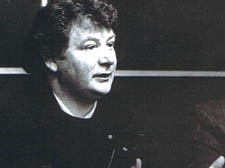|
|
 |
| |

Joe McVeigh |
In times of Troubles, priest who fought for parishioners
Despite knowing he could become a target, Joe McVeigh stood up to Ulster’s ‘tyrants’, writes Peter Berresford Ellis
Taking a Stand: Memoir of an Irish Priest.
By Joe McVeigh.
Mercier Press
IF there is an important autobiography to come out of the recent “Irish Troubles”, this is it.
Joe McVeigh is an extraordinary man. Born in County Fermanagh, Northern Ireland, in 1945, he studied at Maynooth seminary and was ordained into the priesthood. But his faith was a radical one, for he believed that inextricably linked to the Christian message was Christ’s teaching of social justice.
His beliefs were confirmed while working on a building site in London and, as the struggle for civil rights began to gain momentum in Northern Ireland in the 1960s, the simple demand for “one man, one vote”, McVeigh threw himself into that cause.
When the government used its armed forces to suppress the struggle, he was soon engaged in trying to defend his parishioners against the excesses of state-backed Unionist death squads, the RUC and the British Army.
McVeigh writes: “From a moral or ethical perspective I had to make a clear distinction between state violence and Republican violence.
“They were not the same and they were not equal. They never are in a situation where a colonised people are in conflict with the state/government. Politically and morally they were not the same. I define the primary violence as that of the British state/Crown forces/Unionist murder gangs, and IRA violence as a secondary, a response to a situation of institutionalised violence and tyrannical government.”
It was a brave man who spoke out against injustice. McVeigh insisted on celebrating mass in Long Kesh with the internees there. He, too, became a target, and when priests were shot and killed, he was well aware of the dangers of speaking out.
He became more critical of the Catholic hierarchy as it remained silent and even tried to silence those priests who spoke out against injustice.
McVeigh’s autobiography ends with a degree of optimism at the Good Friday Agreement, but without illusions as to the magnitude of the task that has to be faced.
Not the least is the task of having to unpick two centuries of imperial propaganda that has been used to divide one religious community from the other. That is essential if there is to be a reunification of Ireland.
•
•
|
| |
|
 |
 |
|
 |
|


